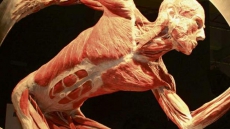OTTAWA - The lawyer for the son of murdered Canadian photojournalist Zahra Kazemi is calling on Ottawa to close a legal loophole after the Supreme Court of Canada shut the door on his lawsuit against the Iranian government.
The Supreme Court ruled Friday that Stephan Hashemi does not have the right to sue the Iranian government over her death, ruling 6-1 that the State Immunity Act prohibits such a suit.
But they lobbed the issue back to Parliament, saying legislators could simply change the act, which would open the door for Stephan Hashemi's civil lawsuit.
"Parliament has the power and capacity to decide whether Canadian courts should exercise civil jurisdiction," Justice Louis LeBel wrote for the majority. "Parliament has the ability to change the current state of the law on exceptions to state immunity, just as it did in the case of terrorism and allow those in situations like Mr. Hashemi and his mother's estate to seek redress in Canadian courts. Parliament has simply chosen not to do it yet."
Hashemi's lawyer Kurt Johnson said he was disappointed with the decision.
"But we echo the majority's call to Parliament to carve out an exception to the State Immunity Act for acts of torture," he said in an interview.
"These are horrific acts; these events are tragic and there needs to be some form of access to a remedy. And if the courts won't provide it, given the current state of the law, then the law needs to be amended."
The Canadian Centre for International Justice also called on Parliament to act in response to the ruling.
"We had hoped the court's ruling would be more responsive to the growing need of families and survivors to obtain redress but now, if Parliament doesn't act, Canadian torture survivors will likely never achieve justice," said Matt Eisenbrandt, the centre's legal director.
Iran had argued it was shielded by the State Immunity Act.
The Canadian government intervened to defend the validity of that law, but said that in no way means it condones torture.
Government lawyers argued that preserving the validity of the law was necessary for the stability of international relations.
Johnson argued in court that the immunity law denies access to justice and is unconstitutional.
A lawyer for Amnesty International, another intervener, argued that the state immunity law was absurd, saying the appeal to the high court was a chance to "set the record straight."
Hashemi waged a relentless campaign for justice on behalf of his mother for more than a decade.
The case wound its way to the Supreme Court after Hashemi filed a civil action in Quebec Superior Court against Iran, its head of state and chief prosecutor as well as the former deputy intelligence chief of Evin Prison.
Hashemi's lawsuit named the Islamic Republic of Iran; its leader, Grand Ayatollah Ali Khamenei; former Tehran prosecutor Saeed Mortazavi; and prison official Mohammad Bakhshi.
Nicknamed "Butcher of Journalists," Mortazavi was Tehran's prosecutor general in 2003 and signed off on Kazemi's detention.
The lone high court dissenter, Justice Rosalie Abella, said Hashemi should have the right to sue Mortazavi and Bakhshi.
The federal government has been a vocal critic of Iran and severed diplomatic relations in part because of the country's abysmal human rights record.
Kazemi, a Canadian citizen who was born in Iran, was arrested while photographing a demonstration outside Tehran's notorious Evin Prison in the summer of 2003.
She was thrown in jail, where she was tortured and raped before dying in hospital almost three weeks later.
The extent of what she endured was later revealed by a doctor, who worked for the Iranian Defence Ministry and who examined the 54-year-old woman in hospital. He spoke publicly after he successfully sought asylum in Canada.
After examining Kazemi after her arrest, the doctor said he found clear signs of torture and sexual assault, including broken fingers, missing fingernails, a broken nose, evidence of whipping and deep lacerations.




